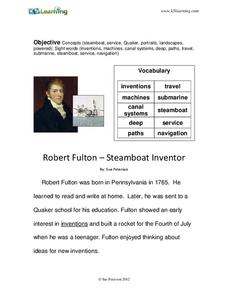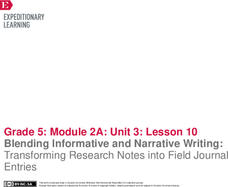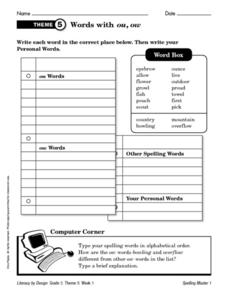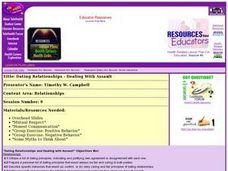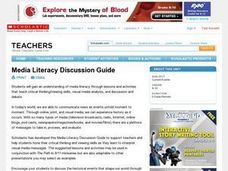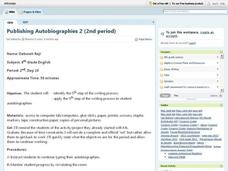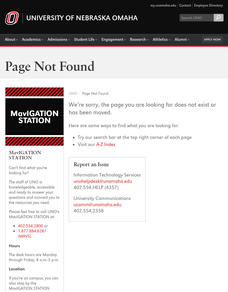Curated OER
Subject Object Pronoun Practice
Practice substituting subjects and objects in a sentence with the correct pronouns. A grammar worksheet prompts young learners to fill in the blanks for ten missing subjects, and then ten missing objects in different sentences.
It's About Time
Run and Jump
Has your class wondered how fast a human could run or how high they are capable of jumping? Help them understand these concepts as they explore acceleration and use an accelerometer to make semiquantitative measurements of acceleration...
K5 Learning
Robert Fulton – Steamboat Inventor
Examine the life of steamboat inventor, Robert Fulton, through reading comprehension worksheet that includes both multiple choice and short answer questions. Then, take part in a word search and write definitions, words, and...
Reed Novel Studies
Flush: Novel Study
Standing up for beliefs sometimes leads to trouble! The father in Flush takes knows this all too well when he sinks a boat in protest to its illegal dumping. With his dad behind bars, the son, Noah, takes matters into his hands by...
EngageNY
Blending Informative and Narrative Writing: Transforming Research Notes into Field Journal Entries
The fabulous four. Scholars learn the four key components for creating an excellent journal entry. They then work to create a journal entry rubric and participate in a mini lesson about organizing and outlining journal entries.
EngageNY
Mid-Unit 3 Assessment, Part II: Organizing Notes for a Public Speech
It's all a matter of opinion! Pupils take Part II of the mid-unit assessment, in which they continue organizing their notes in preparation for writing an opinion speech. Using the resource, they add reasons, evidence, and a concluding...
Curated OER
Worksheet 12 Vocabulary Review: Expressing Past time, Part Two
In this vocabulary worksheet, learners read 8 sentences and analyze the word in bold type. From four choices, students circle the letter of the word or phrase that means the same as the word in bold.
Curated OER
How Can You Predict the Characteristics of an Unborn Baby?
Students compare three sets of unlabeled human chromosomes and gather related data, trace chromosomes to pair them, and make observations about them.
Curated OER
Hunger/ Nutrition
Seventh graders investigate nutrients and nutrition to determine what types of food the body needs for energy. They study each type of nutrient and why it is important to the body. They determine what a balanced diet is by completing the...
Curated OER
The Rotten Truth
Fourth graders watch a video about how much solid waste is produced by each person and how it is disposed of. Using the internet, they identify and interpret data on the type of trash thrown out the most. They offer possible solutions...
Curated OER
Literacy by Design: Theme 5 & 6
In this literacy and word usage instructional activity, students complete several pages of activities that help them learn how to spell and use words with the sounds of ou, ow, oi, and oy as well words with the silent consonant sounds of...
Curated OER
Magnetic Discovery Bottle
Young scholars examine how to conduct simple investigations and use simple equipment to gather data. In this magnet lesson students decide what types of objects are attracted to magnets.
Curated OER
Physical Differences
Students examine physical differences amongst themselves. In this diversity lesson, students read the book We're Different, We're the Same. Students name things about their appearance that is different from the person next to them.
Curated OER
Adult ESOL: Obtaining Employment
Students study how to complete a job application. They identify personal information, employment history, education, and references. They work in pairs to complete an activity sheet and participate in a speaking exercise to ask and...
Curated OER
We the Past
Learners study philanthropy related terms and philanthropy in the United States and their local community. In this philanthropy lesson, students study pictures of present and past Americans and discuss their philanthropic acts. Learners...
Curated OER
Work and Leisure
First graders distinguish between work and leisure activities, identify examples of people participating in each of these types of activities, and put them in the correct category.
Curated OER
Mummy Tales
Students research types of mummification. In this burial customs lesson, students work in groups to research different types of mummies and present their research to the class. Students compare and contrast the types of mummification.
Curated OER
What's Wrong - Intensive Reading
Students discuss the different types of reading and when to use each type. They read passages and try to find the mistake in each sentence.
Curated OER
Dating Relationships - Dealing With Assault
Learners critique a list of dating principles, indicating and justifying agreement or disagreement with each one. They prepare a personal list of dating principles that would always be fair and caring to both parties. They define assault...
Curated OER
Media Literacy Discussion Guide
Students examine and analyze visual media and its messages critically. They determine whether specific media messages inform, entertain, or persuade and what factors influence the media. Using primary sources, they participate in peer...
Curated OER
The Goat in the Rug
Students write a personal narrative about something they produce at home. (examples: make a sandwich, clean room, set table, do homework). Students should remember to mention different types of resources and intermediate goods used.
Curated OER
Publishing Autobiographies 2
Eighth graders identify the 5th step of the writing process and apply the process to student autobiographies. While in the computer lab, they continue to type their autobiographies, and create covers for their autobiographies.
Curated OER
Economics and Literature
Young scholars discuss capital resources and the types of machines their families use at home. They discuss how these machines increase productivity, and how these concepts connect to the law of demand and capital invention.
Curated OER
Population Dynamics
Students discover how organisms are dependent on one another for survivial. They also discuss how to conserve natural resources. They compare and contrast the different types of symbiotic relationships as well.




